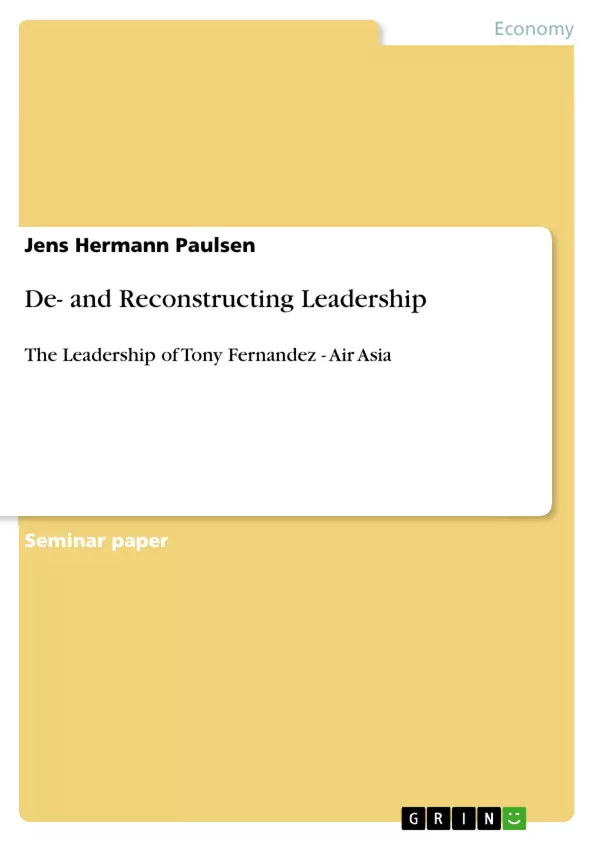This project will outline Tan Sir Anthony Francis Fernandes (Anthony Fernandes) role in the raise of Malaysian based AirAsia, which was named Malaysia Airlines at that time, from being a company close to bankruptcy at 2001, when it was bought by him for a symbolic amount of $0.25 USD to one of the most successful airlines in the world.
Fernandes chose to set up an airline in the one of the toughest times of the airline industry; Right after the 9/11 attacks in with hundreds lost their lives and costumers were too scared to fly, additionally were the oil prices quite high and along with the acquisition there came a debt of $11 million USD. (e.g. White 2010) Despite this unfortunate starting position he did not fail. Already in 2002 one year after the acquisition Fernandes was able to take the first profits and in 2008 the revenue already reached 877 million USD. (e.g.Times 2010) He was awarded as “Asia Businessman of the Year” by the Forbes magazine also he became member of the French Legion of honor (for his contribution in aviation industry) and in 2011 her majesty Queen Elizabeth II honored him by appointing him as a Commander of the British Empire. He was honored for his work to promote commercial and educational links between the UK and Malaysia. (e.g.Times 2010) The question arising is how did Tony Fernandes manage to turn a business idea likely to fail in such a big success?
Inhaltsverzeichnis (Table of Contents)
- Introduction
- Methodology
- Theory
- Charisma and Leadership
- Transactional and Transformational Leadership
- Discourse
- Deconstructing/ Analysis
- Leading by biography
- Transformational Leadership
- Discussion / Different Context
- Conclusion/ Future Research
Zielsetzung und Themenschwerpunkte (Objectives and Key Themes)
This project examines the role of Tony Fernandes, CEO of AirAsia, in the rise of the Malaysian airline from near bankruptcy in 2001 to its current success. The paper investigates how Fernandes, amidst challenging circumstances, achieved remarkable success, exploring whether it stemmed from a brilliant business idea or his leadership qualities. It seeks to analyze how Fernandes inspired and motivated his employees to achieve his vision and the key factors contributing to his leadership effectiveness.
- Fernandes's role in transforming AirAsia from near bankruptcy to a global success
- The influence of Fernandes's leadership style, including the role of charisma and transactional leadership, on AirAsia's growth
- The importance of creating a compelling narrative to inspire employees and foster belief in the company's vision
- The effectiveness of Fernandes's methods in motivating and leading his workforce
- The application of Fernandes's leadership strategies in a global context
Zusammenfassung der Kapitel (Chapter Summaries)
- Introduction: This chapter provides context for the study, highlighting Fernandes's acquisition of AirAsia in 2001 and its subsequent transformation. It raises the question of whether Fernandes's success stems from an exceptional business idea or his leadership qualities.
- Methodology: This chapter outlines the research methodology employed, emphasizing the use of secondary sources due to the inaccessibility of primary data. It details the type of sources used and clarifies the focus on qualitative data.
- Theory: This chapter introduces key theoretical concepts, including charisma, transactional leadership, and discourse, which provide a framework for analyzing Fernandes's leadership approach. It explores the concept of charisma as a discourse between a leader and their followers.
- Deconstructing/ Analysis: This chapter delves into the analysis of Fernandes's leadership, focusing on the aspects of "leading by biography" and transformational leadership. It examines how Fernandes used narratives about himself and the company to inspire his followers.
Schlüsselwörter (Keywords)
The paper focuses on key concepts related to leadership, specifically focusing on Anthony Fernandes's leadership style, the success of AirAsia, charisma, transformational leadership, and the role of discourse in building a compelling vision for followers. It explores the practical application of leadership theories in a real-world business context.
Frequently Asked Questions
How did Tony Fernandes save AirAsia?
Tony Fernandes bought the near-bankrupt airline for $0.25 USD in 2001 and transformed it into a global success through visionary leadership and a low-cost business model.
What is Tony Fernandes's leadership style?
His style is often characterized as transformational and charismatic, focusing on inspiring employees and creating a compelling narrative for the company's future.
What challenges did AirAsia face in 2001?
The airline industry was in crisis following the 9/11 attacks, oil prices were high, and the company carried a debt of $11 million USD.
What does "leading by biography" mean in this context?
It refers to how Fernandes used his personal story and a clear corporate discourse to build trust and motivation among his followers and customers.
What awards has Tony Fernandes received?
He was named "Asia Businessman of the Year" by Forbes and appointed as a Commander of the British Empire (CBE) by Queen Elizabeth II.
- Arbeit zitieren
- BA Sc. Jens Hermann Paulsen (Autor:in), 2011, De- and Reconstructing Leadership, München, GRIN Verlag, https://www.grin.com/document/204571



